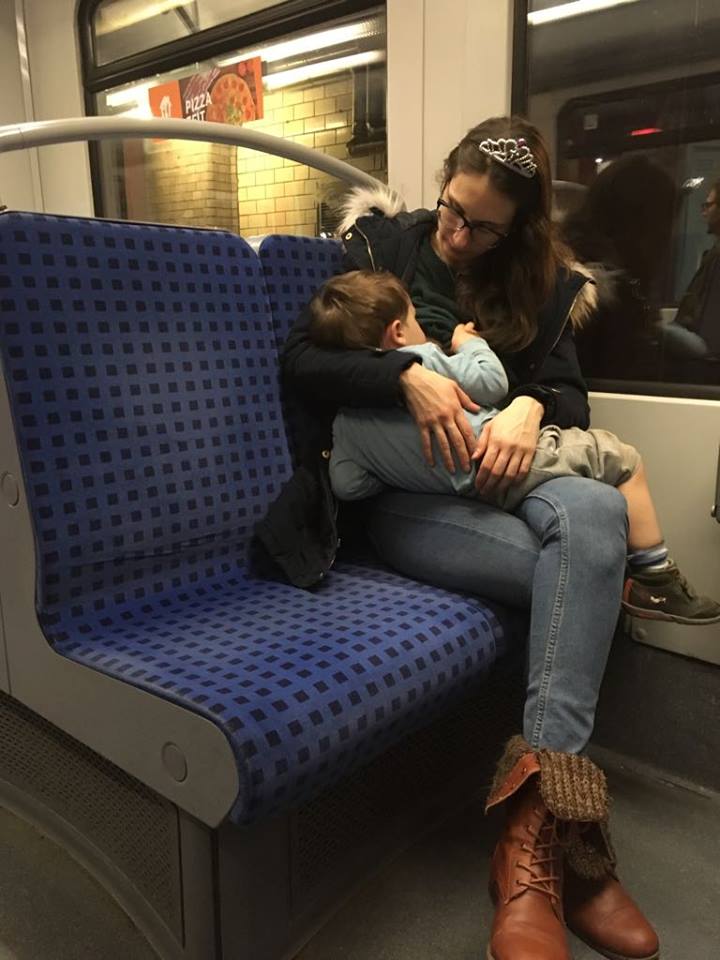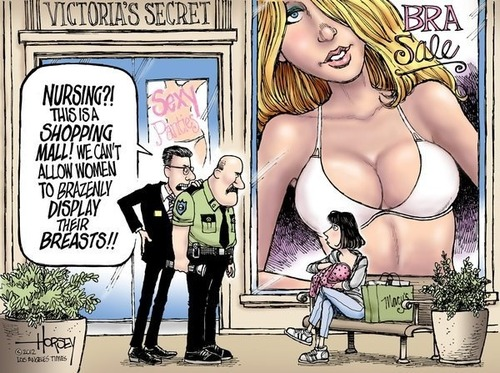I`ve been meaning to write about breastfeeding for a long time, but didn`t feel like I was quite ready yet. And even though I`m doing it now, I`m not feeling very confident. My breastfeeding journey has not yet ended and I might not be the most entitled to give you advice on the matter. But, you know what, being a parent, especially a mother (I`m not being gender biased, misogyny is very present in a mother`s life), means your confidence is constantly being undermined by judgement, peer pressure (let`s say) and the daily struggles of raising a child. So let me use this very vulnerable moment to share an insider`s view on the matter. I hope you don`t mind my honesty.
“Breastfeeding is easy”
I had never given much thought on breastfeeding before. I worked with children since I was 14 and took care of some very young babies. I saw their mothers breastfeed and it seemed to me like the most natural thing to do. In Brazil, when mothers couldn`t breastfeed themselves, I`d heard of breastmilk donations, I had never really heard much about bottle feeding. I only realized mothers chose to bottle-feed when I came to the UK (I was already pregnant then).
That idea puzzled me. How can that light-yellowish powder be better than our own breast milk? I read about it and I realized it wasn’t better, in fact it was much worse. There were a number of risks involved, here are some examples:
- “For infants, not being breastfed is associated with an increased incidence of infectious morbidity, including otitis media, gastroenteritis, and pneumonia, as well as elevated risks of childhood obesity, type 1 and type 2 diabetes, leukemia, and sudden infant death syndrome (SIDS).
- Among premature infants, not receiving breast milk is associated with an increased risk of necrotizing enterocolitis (NEC).
- For mothers, failure to breastfeed is associated with an increased incidence of premenopausal breast cancer, ovarian cancer, retained gestational weight gain, type 2 diabetes, and the metabolic syndrome.” (Stuebe, 2009)
Why would anyone want these risks? I was determined to breastfeed my baby for at least two years or until he decided to stop.
When my son was born I started the breastfeeding quest. I had no idea it was going to be so hard. To make myself clear: it is the hardest thing I’ve ever done in my life. More difficult than moving countries, than being pregnant, than getting divorced, than going through uni, than being a teenager… I could go on, but I think you get the point.
For starters, I had sore nipples. The term “sore nipples” is an understatement. They were cracked, bleeding, swollen, bruised, scabs would form and get ripped off the next feed. The pain was hard to bear. I didn’t know what was happening. No one had ever told me this was a thing. When people talked about sore nipples I imaged the pain you feel after you go to the gym for the first time in ages, or something like that. I never thought I would cry at every feed, that I would fear the next feed and that I would be repeating in my head, halfway through them: “please stop soon”.
I also wasn’t aware that babies can feed very often for a very long time and it’s absolutely normal. My son fed for about 1 hour and half every feed, and needed a feed every two hours or so (except during the night when he would wake up only once for a feed). So for the first week of my son’s life I was breastfeeding during a big part of my waking hours and in excruciating pain. I was close to breaking point.
Tired, confused and about to have a nervous breakdown – ok, I did have a few meltdowns, but I didn’t go insane – I thought there was something wrong with me. Was my milk not good or strong enough? Is that why my son was feeding so much so often? Was he starving? My (then) husband and his family supported my fears. “Try giving him a bottle”, they said, “Breastfeeding is not for everyone, you know”. So I did it, I gave him a bottle, and I cried every second of it.
I was devastated. I had failed my son. My body was defective and couldn’t offer my son what was best for him. That’s how I felt, and I cried most of that night, too.
Still, I wasn’t ready to give up. The break from the feeds had given my nipple some extra time to heal and I’d had enough rest to feel a bit more energetic in the morning. A friend of mine from primary school, Ana Marta Santos, had earlier congratulated me on my pregnancy and said that if I needed anything, especially while breastfeeding, that she would be glad to help. I didn’t understand at the time but I was now willing to take on that offer. Too many miles apart, I called her on Facebook and begged for help.
Ana Marta had gone through the same. She told me it took her 7 days for the new, stronger skin to substitute the cracked one and for the nipple to stop hurting. “The best thing”, she said, “is to let the nipple breath”. So I kept my breasts exposed as long as I could to let the wounds dry. When I had to walk around the house I’d only wear a light, thin shirt; no bra. Though milk would drip now and then, it was working wonders. The drier the scabs, the less it hurt. Ana Marta also taught me a mantra: “It shall pass. One day after the other”. I tried to remind myself of that every day, to take one day at the time as a little victory and remember that what I was going through would not last forever. Things would get better. Things would get easier.
My mother-in-law had kindly bought me lanoline cream, but it kept the wounds moist, so they took longer to heal. Ana Marta also warned me about these creams so I stopped using them.
Just as it happened to my friend, on the 7th day the pain was nearly all gone. It wasn’t gradual, on that day the pain just reduced by about 80%. It was magical. It’s hard to describe the relief I felt. By the 10th day the pain was fully gone. I felt revigorated. I was exclusively breastfeeding on demand and I was nailing it. Check-me-out!
This experience can be quite challenging and confusing. Another friend of mine, Gisela Bataller, who went through a similar situation with her second daughter, told me how she had mixed feelings about breastfeeding. She really wanted to breastfeed and it made her feel warm and loving, watching her daughter so content at the breast; but the pain made her hate feed times. I knew that feeling all too well, and I began to understand why many mothers give up breastfeeding.
Stoned
Basically, when you breastfeed, your body is using loads of energy to produce this milk that is tailored for your baby. This process interferes with pretty much EVERYTHING in your body. At first, you lose all that weight you might have gained when you were pregnant. Great! Your body needs loads of energy to make the milk and it will take energy and nutrients from wherever it can to make the perfect milk. So if you don’t take care of yourself, don’t worry about your baby, his milk will be just as good, but you will keep losing weight and might get some health problems along the way. So, EAT! It’s common to crave sugars, but I recommend going for starchy foods as these complex sugars last longer and are more useful. Potatoes, pasta, bread, rice, grains, etc are all great choices, especially whole. If you feel hungry often, eat often, but avoid junk and industrialized food as they might not give you enough nutrition; and bring about some undesirable side effects.
Nevertheless, I was breastfeeding for long hours, with short breaks during which my son might fall asleep in my arms and it was hard to put him down to go get some food, even worse to make some. I didn’t have much help at home, my husband had to work all day and I would be at the house by myself. I was new in the country, so didn’t have any friends, and my family was miles away in Brazil. I relied mostly on sandwiches and microwave meals, which isn’t ideal but got me going. I still felt hungry a lot of the time and that made me impatient and tired. Ana Marta told me how she survived the first weeks after birth eating mostly white bread and cream-cheese.
The reason (probably… well, at least it’s one of them) why I didn’t lose my mind during this period, and continued to love my son more than anything else in the world even though he was causing me deep pain, is because I was stoned.
Most of us are aware of oxytocin. Known as the “love hormone”, this chemical is released in the mother’s brain when she breastfeeds. It works as an antidepressant and has a number of benefits in the body. But the chemistry of breastfeeding is ever more complex than that. Usually, if the regular amount of one chemical is altered, than the whole system adapts to the change. When we breastfeed, there is a lot going on in our bodies and brains.
After giving birth, a mother’s brain is flooded with endocannabinoids such as anandamide (Burgierman, 2011), which is analogous to Marijuana’s cannabinoid, THC. The chemical might play a role on pain management, and to help the mother feel calm and loving after such a traumatic event such as childbirth. Anandamide and 2-AG are also present in breastmilk and play an important role in child development (I’ll comment below). I suspect breastfeeding also increases the release of endocannabinoids in the mother’s body.
In the first weeks of breastfeeding, I felt quite different. Even though I was suffering a great deal, I felt mostly calm and warm. During one feed, I wrote down what I was feeling during 45 minutes, because I was fascinated:
- I had a light headache, like a pressure inside my cranium. Just like when you overdue weed, I felt more aware of that pain. I also felt more aware of the my episiotomy’s stitches and the pain from it.
- My senses began to change and started to give more attention to things I wouldn’t normally notice, like the warmth of my son, the softness of the sheets, the feeling of a slight breeze when someone opened the door.
- Munchies!
- My nipples then started hurting less, except for eventual short spikes of pain.
- After half an hour, I still feel high and slightly dizzy.
- Heating sensation in different parts of my body, especially tempers and back of my head.
- No pain.
- Body felt very heavy and I had no intention to move.
- Emotional and high, I had a constant little smile on my face.
- I felt very relaxed and sleepy.
It felt pretty much like smoking weed. After two weeks, these effects were no longer there 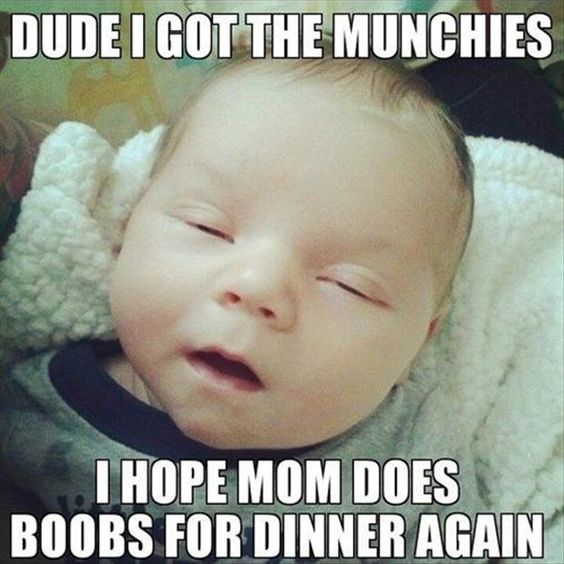 during feeds. That’s because when you have too much of these endocannabinoids floating around, your body decreases the number of their receptors and you create resistance to their effects. You know how people who smoke cannabis everyday don’t get as high from it anymore and need to increase the dosage? Same idea.
during feeds. That’s because when you have too much of these endocannabinoids floating around, your body decreases the number of their receptors and you create resistance to their effects. You know how people who smoke cannabis everyday don’t get as high from it anymore and need to increase the dosage? Same idea.
The same does not happen with oxytocin, breastfeeding increases not only the release of this hormone but also its receptor. The more you breastfeed the more you feel the love.
“When a mother nurses, not only do her blood oxytocin levels increase, but her body makes more receptors, permanently increasing her feelings of love – and her ability to feel loved. Mom’s sensitivity to oxytocin’s power is one of the most fundamental ways she changes as a new mother” (Alpha Parent)
By insisting in the tough beginning of my breastfeeding journey, I let my body find a balance and adapt to the new chemistry needed for me to carry on. Once that was done, I felt much more confident and comfortable with my breastfeeding. And I loved it!
Getting help and support
Let’s get something straight: most health professionals are not prepared to deal with breastfeeding mothers. Though I received some great advice along the way, I also receive conflicting advice and warnings. At the hospital, nurses were very helpful showing how to breastfeed. Health visitors were at times helpful, at others scary. I co-slept with my son from the beginning. It makes things easier when you breastfeed because you don’t need to get up when the baby wakes up. I’d just turn around, lift my shirt and go back to sleep. I noticed I would wake up at the same time my son did, and that my sleep was a lot lighter than it used to be; so if anything went wrong I would be up and alert.
A health visitor frowned when I mentioned it, stating the dangers of bed sharing. I felt like I was doing something very wrong and dangerous, but my instincts were telling me the opposite. I tried to make my son sleep in his Moses basket, but he didn’t want to. I kept receiving the message that I had to try and force him to sleep on his own. I was too tired to keep insisting and I didn’t want my son to cry all night, so I gave up, but still felt like a criminal.
At a breastfeeding support group, another health visitor then said co-sleeping was actually a good idea. I felt much better after that. I later realised there are many benefits in co-sleeping and I wish I knew this earlier. It would have saved me a lot of hassle and anxiety.
Gisela, however, had a harder time than I did. Click here to read her story.
Shaming and judging
Once I was comfortably breastfeeding my son at the reception of Jobcentre Plus, waiting for my sister to sort out her national insurance number, when a female member of staff came to me and said: “Why don’t you breastfeed in the baby change, for your own privacy?”. She didn’t wait for me to answer, she unlocked the door next to me and kept doing hand gestures for me to get in there and repeating louder and slower: “It’s for your own privacy”. She’d heard me speak to my sister and she knew I was a foreigner; I’m not sure if she thought my English was bad or if I was stupid. Not given a chance to answer, I looked around for a friendly face to give me courage, but all I found were other members of staff, laughing at the situation, as if I was such a weirdo for doing such a thing in public. I felt so small. My eyes filled with tears as I walked in that tiny, smelly room and sat at the most uncomfortable wooden chair to resume the feed.
Later, when I mentioned what happened on a Facebook group, other mums kept saying I shouldn’t have gone in, I should have said something. It was the only time something like that happened to me and I froze. I didn’t know then what they were doing was illegal; I wasn’t confident I was following the country’s social behaviour correctly; I just never thought this would happen to me and I was unprepared.
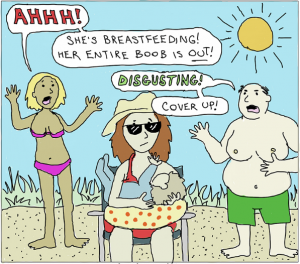 When I first came to the UK I was told Muslims might have a problem with breastfeeding in public and that I should watch out for them. They never even looked at me. I’ve only been judged by white Europeans (that’s just my experience, you might have a different one and I acknowledge that). I heard things like: “Oh, but you are going to stop breastfeeding when he’s 18 months old right? It’s just ridiculous after that, they don’t need it”; “You shouldn’t breastfeed after he starts walking, it’s weird”; “Why don’t you give him a bottle when you are out?”; “This is a very private moment, are you sure you want to do it in a busy place like this?”.
When I first came to the UK I was told Muslims might have a problem with breastfeeding in public and that I should watch out for them. They never even looked at me. I’ve only been judged by white Europeans (that’s just my experience, you might have a different one and I acknowledge that). I heard things like: “Oh, but you are going to stop breastfeeding when he’s 18 months old right? It’s just ridiculous after that, they don’t need it”; “You shouldn’t breastfeed after he starts walking, it’s weird”; “Why don’t you give him a bottle when you are out?”; “This is a very private moment, are you sure you want to do it in a busy place like this?”.
To be fair, I also received several kind smiles and compliments from other women passing by while I breastfed. These little gestures remind you you’re not doing anything wrong at all.
My mum told me when me and my siblings had turned one she was embarrassed to breastfeed us. I can see why a lot of women feel this way, maybe even earlier, and give up breastfeeding. I have heard stories of breastfeeding mothers that heard awful comments in restaurants; that weren’t allowed to do it in a relative’s house; that are suing businesses for discriminating against them.
It doesn’t mean that bottle-feeding mums don’t get discriminated. Nasty looks and comments from breastfeeding mums may happen at any time. Shaming online is getting increasingly common, too. In some of this online groups, breastfeeding mums talk about bottle-feeding as if it was child abuse. I might not understand mothers who dismiss even trying to breastfeed with a comment like: “It’s not for me”; but I’d rather not judge. I don’t know what’s behind that decision and it’s too easy to point a finger when you’ve had a different reality.
Inconveniences
Leakages, constant thirst and hunger, muscle aches from breastfeeding in the same position for a while are some of the regular inconveniences. When babies are teething they commonly bite, too. I won’t lie to you, it hurts. I get very tense sometimes, leaving a finger next to his mouth, ready to get him out of the breast if he starts biting. This phases come and go, it’s not a constant thing. Most of the time you don’t have to worry about them.
But by far, the worst “inconvenience” I had was mastitis. The first one (I had about six of them, I think… I lost count!) was the worst. A mastitis is when a milk duct gets blocked. It’s painful, but massaging it in the shower, breastfeeding more with that breast and expressing usually solves the problem. In my first one, however, it turned into an abscess – it got infected.
I wasn’t feeling too well, it felt like the beginning of a cold. Then my breast started hurting 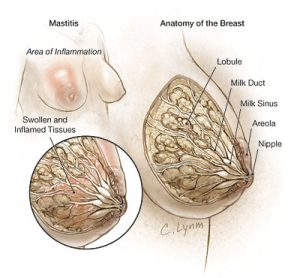 and I felt a lump, so I called my GP. She told me she would see me that day, so I got ready to go; put my son on his pushchair and stopped by a café to eat something on the way to the surgery. I then started to feel very sick and couldn’t eat my food. Pushing the pram became very hard because of the pain. The lump was getting bigger and I could feel it burn. By the time I got to the GP’s office, I was shaking, with a temperature of over 39,5C. I was prescribed antibiotics, which take two days to kick in, so I was very ill for those two days. I kept getting mastitis, but none as bad as the first.
and I felt a lump, so I called my GP. She told me she would see me that day, so I got ready to go; put my son on his pushchair and stopped by a café to eat something on the way to the surgery. I then started to feel very sick and couldn’t eat my food. Pushing the pram became very hard because of the pain. The lump was getting bigger and I could feel it burn. By the time I got to the GP’s office, I was shaking, with a temperature of over 39,5C. I was prescribed antibiotics, which take two days to kick in, so I was very ill for those two days. I kept getting mastitis, but none as bad as the first.
Something that majorly still affects my life is the fact my son won’t go to bed without a feed. We tried to have someone else put him in bed but he will just cry endlessly and I don’t want him to sleep from exhaustion after crying for hours. That means we still co-sleep. His cot bed is next to my bed and he rolls there next to a feed or just falls asleep in my bed. It also means I can’t go out at night, because even after he falls asleep he might wake up, and if I’m not there to nurse him back to sleep he won’t go back to sleep.
When he started crawling he would wake up in the middle of the night and start crawling, even crawl in his sleep sometimes. He crawled out of bed twice, waking up after hitting the floor. I freaked out. The only solution I could think of was sleep training him so he would sleep safely in his cot. All these cry-it-out methods made me feel physically ill with anxiety. I just couldn’t let my baby cry.
Then I went to the UK Breastfeeding and Parenting Support group on Facebook and asked for advice. One of the suggestions was that I get rid of the bed and put my mattress on the floor, so even if he fell off the bed, my son wouldn’t get hurt. It sounded extreme to me, and to my friends and family. My Brazilian mindset was seeing this as being a weak mother who will spoil her child. But then I realised letting my son cry himself to sleep was way more extreme. Why were bed legs so important to me anyway?
I dismantled the bed and put the base on the floor with my mattress, next to his cot bed with an open side, and kept on breastfeeding my son to sleep. That is still how we sleep today, over a year later.
Worth it
Breastfeeding is extremely hard – I think I mentioned it before – but it’s worth it. Besides all the know health benefits of it, there are also the things that are hard to measure, such as the irreversible new brain connections that you and your baby will benefit from. All that chemistry that goes on in your brain also goes on in your baby’s brain and it helps him develop into an intelligent, loving child, who feels safe and connected. This may sound intangible but it’s extremely important. These early moments of a child’s life have a central role in determining what kind of adult they will become. By making sure they have all the oxytocin and oxytocin receptors they can have, helping them regulate their brain chemistry and neuronal connections, we are not only assuring them a healthier life, but one filled with love and warmth.
What we need to fight against is not bottle-feeding mothers, or whoever thinks differently, but disinformation and shaming. What we need to fight for is: professionals that are more prepared to support parents; clear, honest information for everyone and, above all else, empathy. That’s what I believe in, and that’s why I shared my story.
I’m still breastfeeding (only during the night, as per my son’s preference); my son is 22 months old. I still get mixed feelings about it. Sometimes I just want to stop. But then I lie down to feed him and watch him as he strokes my belly – I supposed that’s his way of saying “thank you for the milk” – and I’m taken by a happiness I just can’t explain. I’m sure when I do stop, I’ll miss it.

